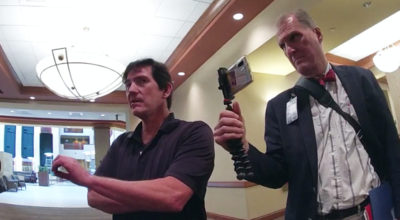
Shameca Burt gives an interview at NoogaRadio Network. David Tulis is at right. (Photo NonogaRadio Network)
CHATTANOOGA, Tenn., Tuesday, Jan. 2, 2024 — Without a vote by the county commission, Lorrie Miller has taken God out of the process of creating crime.
By David Tulis / NoogaRadio Network
The process of creating an arrest warrant, believe it or not, requires God at the heart of it, and Mrs. Miller opts to violate state law in hopes atheism will work better than what honorable state law requires to establish that a crime has occurred.

Lorrie Miller is chief magistrate of Hamilton County, Tenn.
Mrs. Miller is the chief magistrate among four appointees who are called judicial commissioners. Their job is to be at the jail to allow people accused of crimes to exercise their right for adjudication immediately upon entry in the jail. They set bond and assign attorneys to the indigent pursuant to T.C.A. 40-1-111.
Their biggest job is examining officers and victims in requests for arrest warrants.
The magistrate dismisses all cases of seized persons improperly arrested — or they should. If there is a warrantless arrest not in sync with the warrantless arrest statute at §40-7-103, the magistrate tosses the case for due process violation — or she should. When this reporter is arrested for a damaged red taillight by deputy Brandon Bennett, the magistrate makes sure Bennett is there – as I had demanded – to answer charges of false arrest and lack of authority to wrap a private person in the chains of the state trucking administrative law — but magistrate Blake Murchison doesn’t.
Cities and counties in Tennessee run general warrants schemes, outlawed in state and federal constitutions. Hamilton County does, too, with leave of Mrs. Miller. Virtually no misdemeanants are seized under warrant when required. Courts, cops, deputies, bar members play the game of warrantless arrest, and of bills of attainder (seizure of people by group without warrant, or without law).
My 8-page review of relevant law — sent in letter form to Mrs. Miller Dec. 26 — lists the grievance of people such as Shameca Lashon Burt, a woman in the pallet recycling and refurbishing business accused and jailed on a bogus warrant. David Locke o the DA’s office says the charging instrument is not available, and her lawyer Phil Duval doesn’t have a copy. Mrs. Burt is in jail on a warrant sworn out by a cop, if things are going according to the Miller policy.
She has a probation violation hearing before criminal court judge Boyd Patterson 0n Wednesday at the 1:30 p.m. docket.
The Miller policy on the swearing-out process denies the accused the right to be properly sworn against, and the accuser’s duty to appear in person to swear out a breach of the Tennessee criminal code in Title 39.
The accuser, victim or witness avoids the high and scary duty of swearing to his own hurt that a crime has been committed. Meaning, the accuser doesn’t have to invoke God’s name in swearing out the offense. He doesn’t have to face the felony perjury statute for lying. The latter may scare righteousness and caution into an atheist or agnostic, who can avoid swearing altogether and speciously “affirm” to be telling the truth.
Many arrests bad as magistrate denies complainant duty to swear to alleged crime
The short of it is this: Lorrie Miller elevates hearsay and reduces more reliable fact-based evidence presented under oath by witness or victim.
Mrs. Miller, in knocking God out of His supervision of the accuser, injects atheism into Hamilton County court operations by preventing the dread of lying before God in the heart and mind of the witness, victim or accuser.
Three cases in which policy brings injury tell the story of what happens when black-letter law is ignored. Two involve women and one a man. Michael James of the “911 call from hell” fame is victim of abuse by Chattanooga police officer — now state trooper — Lance Hughes. Another account is of a woman, 69, raped by the manager at her apartment complex.
The third focuses on Mrs. Burt, rotting at Silverdale detention center and reporting on radio the terrible conditions in the old women’s wing, including drugs, overdoses and ants.. Accusations against her for theft of discarded pallets come from a cop, who got a report from an employee at Tractor Supply Signal Mountain that Mrs. Burt was stealing pallets next to a dumpster. The accusation puts her in “violation” of a two-year supervised probation agreement, and she is in a cell under four “no bond” orders, she says in a phone call.
Pallet leftovers at Tractor Supply
Did Mrs. Burt really steal pallets? The “gnome librarian” of Alcoa, Tenn., is Ed Soloe, and he is in regular correspondence.

Ed Soloe of Alcoa, Tenn., is the Gnome Librarian.
For there to be a theft, the pallets must have a value to the owner.
The pallets weren’t bought, but were incremental to the purchased item.
The pallets were placed next to a dumpster.
A fee is paid to remove waste from the store.
Are pallets also waste that is removed?
Did the store have a contract of sale or regularly sell pallets to someone?
Can the store prove the pallets even belong to it? Maybe the pallets were dropped there as someone else’s waste.
Were the pallets given away to someone who regularly comes to get them?
If the pallets are given away, they have no value to the store. Nothing of value stolen = no crime.
If the pallets are given away, the store no longer owns them and can’t file charges.
If Tractor Supply does sell them, what is the value of the few that were taken?
Were the pallets stored next to or with other recyclables?
Was there intent or simply an understanding that items left next to dumpsters are freely disposed of per common practice?
The following is from Christopher Sapp, midstate bureau chief for NoogaRadio Network:

Christopher Sapp is midstate NoogaRadio Network bureau chief, a five-baller who can open a clam at 20 paces with his stare, and a court case from 10. (Photo David Tulis)
Most wooden pallets arrive incidental to the purchase of products and are discarded or recycled. Within the industry, the blue colored pallets are actually leased by Chep Industries and are called “CHEP pallets.”
Chep pallets are very sturdy as built from hardwoods rather than the soft pine normally associated with GMA pallets typically used for grocery distribution. Chep pallets have a deposit on them which can be redeemed by the bearer upon return…sort like the 5 cents paid for old coke bottles gathered and delivered back to bottle manufacturers and glass companies.
When I collected pallets years ago, the local pallet company paid $2 for each GMA pallets at $4 for each Chep pallet.
All you need to enter the business is a truck, a trailer, and some heavy duty rachet straps. Once you establish a route, you can easily make $100~200 per day with just a few hours work.
The pallet collection business is rather lucrative for the amount of work, and highly competitive. There very well could have been agreements in place their disposal. In Shreveport, La., where I once lived, the pallet distributor was charging companies for both the pickup and delivery of pallets. Pallets would stack up and become unsightly or take up precious space in the shipping and receiving dock.
We figured out we that we could break into the market by offering to pick up pallets from grocery stores and big box stores for free, saving them the pickup fees, and then selling them to shipping companies at just below retail. The rest we wholesale out to the pallet distributor who hadn’t yet figured out that we were edging in on his business and he was losing profits.
Since the business is so competitive, pallet theft did happen rather frequently…you had to know your customer, the competition, and when the pallets would be set out…you had to be on your game. It was really an Easter egg hunt most of the time and whoever got their first got the pallets.
Perhaps the complaining employee wanted to claim the discarded wood for himself for a side project and she just beat him to it. Perhaps the complaint was the retaliatory act of a current or would-be competitor.

